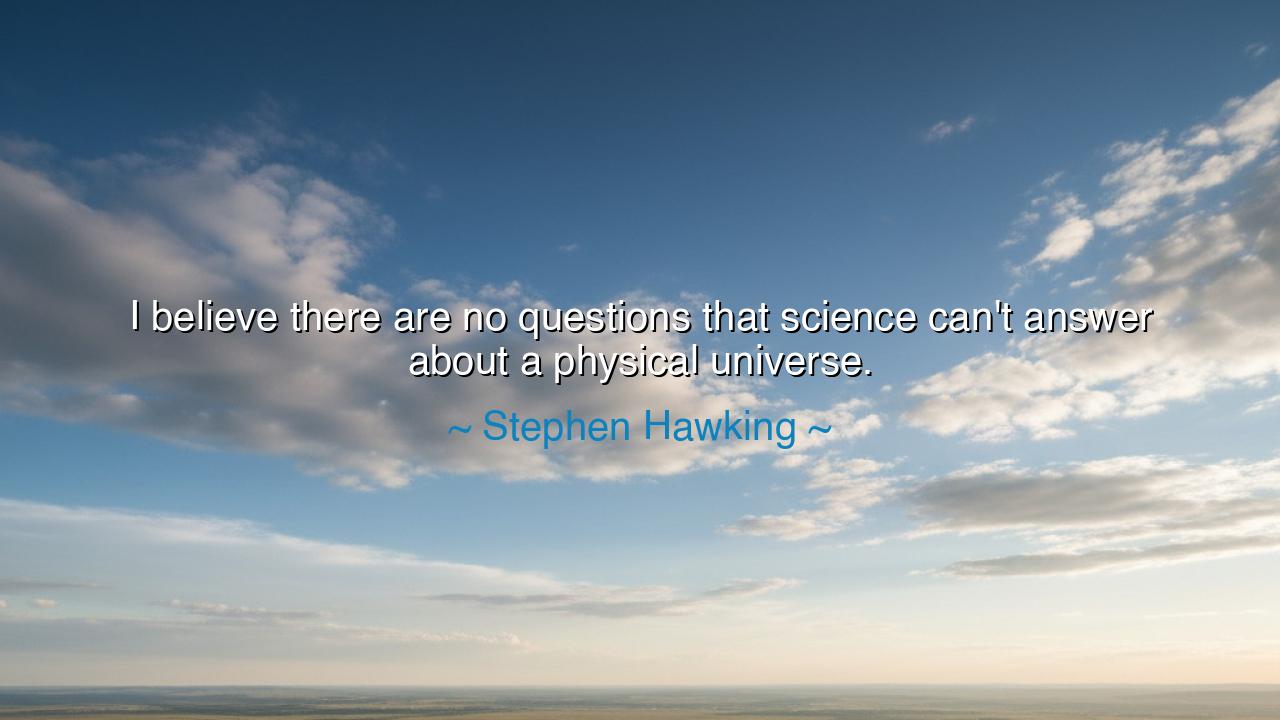
I believe there are no questions that science can't answer about






"I believe there are no questions that science can't answer about a physical universe." These words, spoken by the revered Stephen Hawking, resonate as a clarion call to the power of human inquiry and the relentless pursuit of knowledge. Hawking’s confidence in the capacity of science to unravel the mysteries of the physical universe is not simply an assertion of intellectual might, but a testament to the unyielding spirit of humanity's quest for truth. In these words, we hear a profound belief that the laws of nature are not shrouded in mystery forever, but are waiting for us to discover them, to decode the grand symphony of the cosmos.
The ancients, too, believed in the power of reason and observation to unlock the secrets of the world. The Greek philosophers sought to understand the fundamental principles that governed the heavens and the earth. Aristotle, the father of Western science, believed that by observing the world around him and applying reason, he could uncover the natural laws that governed everything. In his time, these investigations were revolutionary, laying the groundwork for what would eventually become science. Yet, even the great thinkers of antiquity knew that there was much to uncover, and they accepted the challenge of searching for truth. The very essence of science, as Hawking echoes, is the pursuit of understanding—of answering the questions that arise from the observable universe, and in doing so, uncovering the deepest truths about our existence.
Consider the journey of Isaac Newton, a man who embodied the very spirit of Hawking’s statement. Newton, through his mathematical formulations, unlocked the laws of motion and the theory of universal gravitation, revealing the forces that govern the movement of celestial bodies and earthly objects. This breakthrough was not just a technical achievement; it was a philosophical revolution, offering answers to questions that had baffled humanity for millennia. Newton’s work demonstrated the power of science to unveil the hidden order of the universe, and his success reinforced the belief that the natural world, though vast and complex, could be understood through human inquiry. Like Hawking, Newton’s confidence lay in the belief that with the right tools, the mysteries of nature were not beyond the reach of human understanding.
Hawking’s belief in the power of science to answer all questions about the physical universe also mirrors the intellectual courage that emerged during the Scientific Revolution. Think of Galileo Galilei, who, with his telescope, gazed at the night sky and uncovered truths that shattered the ancient view of the cosmos. The heliocentric model of the universe, which Galileo helped prove, was not simply a new scientific theory—it was an intellectual revolution, challenging the assumptions held for centuries by both the Church and scholars. Galileo’s discoveries set humanity on a path of discovery and exploration that has yet to end. His work was a declaration that science, when applied with rigor and courage, could pierce the veil of the unknown, answering questions that had once seemed insurmountable.
But Hawking’s words are not merely a celebration of past achievements—they are a challenge to future generations. Today, we stand on the precipice of discovering even more profound truths about the universe. With the advent of technologies such as quantum mechanics, particle accelerators, and telescopes that peer deeper into space than ever before, science has the ability to answer questions about the origin of the universe, the nature of black holes, and the very fabric of time and space. Yet, as we delve deeper into the mysteries of the cosmos, we must also be mindful of the profound responsibility that comes with such knowledge. Science gives us the power to shape our world, to explore the unknown, but it also demands that we act with wisdom and care. The more we uncover, the more we must ask ourselves: how can we use this knowledge for the betterment of humanity, rather than for destruction or selfish gain?
The lesson in Hawking’s words is clear: the pursuit of science is the pursuit of truth. There are no mysteries beyond our grasp, no questions too great for us to answer if we approach them with courage, reason, and the collective power of human ingenuity. Our understanding of the universe is constantly evolving, and while we may not have all the answers today, we must never stop asking the questions. Just as Newton and Galileo broke the barriers of their time, so too can we—if we continue to believe in the power of science and the potential it holds to illuminate the deepest corners of existence.
In your own life, let the words of Stephen Hawking inspire you to seek knowledge relentlessly. No matter the challenge, whether in your studies, your work, or your personal growth, approach each question with the confidence that there is an answer to be found. Understand that the facts of the world may seem elusive at times, but with persistence, curiosity, and scientific thinking, you too can uncover the truths that shape your world. In the pursuit of knowledge, there are no limits—only discoveries waiting to be made, and questions waiting to be answered. The physical universe, vast and unfathomable, is ours to explore, and in doing so, we come to understand not just the world around us, but our place within it.






AAdministratorAdministrator
Welcome, honored guests. Please leave a comment, we will respond soon